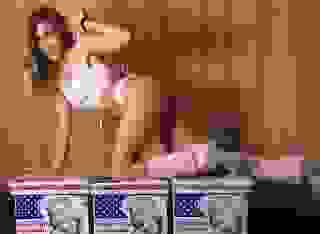- Reviews & Essays
- Og's Blog Pt. 03
Note: You can change font size, font face, and turn on dark mode by clicking the "A" icon tab in the Story Info Box.
You can temporarily switch back to a Classic Literotica® experience during our ongoing public Beta testing. Please consider leaving feedback on issues you experience or suggest improvements.
Click hereCopyright oggbashan
Apart from the Author's name this is supposed to be non-fiction.
A couple of people have asked me to make a permanent record of the real-life anecdotes I had posted in the Authors' Hangout and General Board so this is the third part, previously unposted.
Og as a Scout
Being a 1950s and Early 1960s Boy Scout in Gibraltar, London and Australia.
Subtitles:
1. From Sherman Tank to Communism, or the wrong uniform - again!
2. If there is no record, it didn't happen. If there is a record, it didn't happen like that.
It started in the Autumn of 1953. Some of you may remember that year. It was the year of the Coronation and the year the Korean War ended in a cease fire in July.
The world was very different then. So were Boy Scouts. Why?
In 1953 UK Boy Scouts would have to do National Service and that could mean going to war. Many National Servicemen had fought in Korea. Many Scoutmasters and Scout Leaders were ex-service, having fought in the Second World War. Being a Boy Scout was seen as preparation for National Service.
I was in Gibraltar with my parents. They had a problem - me. Another family had their own son Jeremy as a problem. Both nine year old boys were at school from seven in the morning and one in the afternoon and neither of them could swim. We had come from London suburbs where we were ordinary kids to living in official residences with domestic staff.
At the time our parents were in Gibraltar, and our fathers were significant members of the Garrison. His father was the Air Officer Commanding, number three in the Garrison hierarcy. My father was the Victualling Store Officer, a civilian notionally a departmental Head of the Dockyard. As in practice his superiors were in London he ranked about twelfth in the Garrison.
Gibraltar, then, was a major British garrison. It had been used for training during the war. The beaches were littered with live small arms ammunition and sometimes larger live shells. A year earlier a child had lost a thumb and two fingers after picking up a detonator. We, as military brats, could and did go everywhere. Our favourite toy was a Sherman tank. That tank was the last straw as far as our parents were concerned.
The tank had been abandoned in a restricted area because its transmission had failed and locked the tracks solid. It couldn't be moved except by crane. It was ideal for small boys to climb into and play soldiers. We could transverse the turret, load and unload the machine gun and the main gun - with live ammunition.
We knew that we should never, ever, fire the gun but one day we were joined by a new arrival from England. He pointed the turret at the Sergeant's Mess. We had already loaded an armour piercing shell.
He put his hand on the firing lever. My friend knocked it away as the new boy started to say "What would happen if?" I hurriedly rotated the turret so the gun was pointing out to sea. We opened the breech, removed the shell and put it back on the rack. We made it very clear to the new boy that he had broken our self-devised rules. He apologised and we all left. Once we were outside the restricted area Jeremy and I agreed what we should do. While Jeremy continued back towards the town with the others I made an excuse and went back to the Sergeants' Mess. I knocked loudly on the door. A steward opened the door.
"What do you want lad?" He asked.
"To speak to a sergeant," I replied. "It's important."
The steward knew I was my father's son. He went inside and a senior sergeant came out to me.
I explained what the new boy had done. The sergeant's face turned white.
"It's still got live rounds?"
I nodded.
"OK, lad. I'll deal with it. Thank you."
Within an hour an army bulldozer had pushed that tank off the cliff into deep water. The remains of that tank are still visible to experienced divers. The currents around Europa Point are fierce so most divers can't get near.
Although Jeremy and I had behaved correctly our fathers were worried. They thought we should be doing other things instead of playing with dangerous military hardware.
My best friend Jeremy wanted to be a Boy Scout. I wasn't so keen, but he wouldn't join without me.
Of course Jeremy wanted to be an Air Scout. If I had a preference it was for Sea Scouts, but at the time I couldn't swim, which was an essential to join them. So I agreed to be an Air Scout.
We were too young. The rules said we had to be age 11 and we were 10. But the Air Scouts were short of recruits and the son of the Air Officer Commanding was too good a recruit to turn down. The Scout master wasn't so sure about me. The AOC could help the Air Scouts, but what help could a Victualling Store Officer be? But Jeremy wouldn't join without me, so both of us were accepted as candidate Scouts.
We couldn't even be the basic level of Scouts, tenderfoot. We wore the uniform without any badges at all except the Gibraltar badge.
If I was going to be a Scout, I wanted to be a good one. I read Baden-Powell's Scouting for Boys from cover to cover several times. By the first meeting I probably knew more of that book than any others in the troop. Jeremy just wanted the company and the games. Being the son of the AOC was restricting. He, like I, had to attend formal events, hand round snacks at Cocktail parties, go to parties arranged for children of Garrison officers, and be on our best behaviour too often for 10-year old boys.
He was right. As potential Air Scouts we were at the bottom of the Scout pecking order, at the end of the line for everything, and trainees in everything. We weren't expected to be anything but boys - active and intelligent - but ordinary boys.
Think back, if you are old enough, to just over 60 years ago. The Korean War had just ended in a stalemate on the 38th Parallel. The Garrison of Gibraltar was composed of officers who had fought in the Second World War, as had the NCOs. Our Scoutmaster was a decorated RAF veteran. The other adult assistants were ex-service. During the war, Scouts had played a significant role in the UK's Civil Defence, and some of them had been killed doing that. Whisper it quietly, but the Girl Guides had been better in Civil Defence. They had been more reliable and less excitable.
Boy Scouts had a different age range then. Scouts were aged 11 to 16. Senior Scouts were 16 to 18. Rover Scouts were 18 to 21. Scout troops with those age ranges could do more than troops can today.
Health and Safety for Boy Scouts was not called that. The Scout Leaders were supposed to be reasonably careful but the safety rules relied more on their common sense than procedures. Boys, and Scouts, sometimes died. So did any children. Child mortality in the late 1940s and early 1950s was lower than in the 1930s, but not uncommon. No one had heard of 'compensation lawyers' chasing accident victims.
In the Scout Hut we would play games such as British Bulldog, and 'Get around the room without touching the floor'. Scrapes and bruises were common. Outside, we would play football and cricket - on gravel. Gibraltar didn't have enough grass for a pitch. The service teams played Rugby on gravel. They, like Boy Scouts and all boys of that era, wore shorts and bleeding knees were ignored.
All the schools on Gibraltar closed at 1pm in the Summer term. So we had plenty of free time. Homework was done during the cooler evening.
My father's role soon became useful. The Scouts used to go swimming at Eastern Beach which meant a bus ride. But my father was the President of the Naval and Dockyard Officer's Swimming Club, based on the Jetty at Rosia Bay. Why? Because as the Victualling Store Officer Gibraltar it was HIS jetty, for loading and unloading stores. I spoke to my father, who spoke to the organising committee, and the Air Scouts were allowed to use the Club's facilities from 2pm to 4pm on weekdays, unless loading or unloading were actually happening.
But I still couldn't swim. The Scouts' volunteer swimming instructor, a sergeant instructor in the Garrison, took me in hand to teach me the Army way. He showed me, spread-eagled on a chair, how to move my arms and legs. Then we walked to Rosia Bay. He towed me out thirty yards from the beach, pointed me shoreward and ordered "Swim!". I doggy-paddled, spluttered, and made my way to the beach. Success.
My joy was short lived. I hadn't swum properly. He repeated the process again and again until I could make some attempt at a swimming stroke.
Next week, I had another session. He took me on to the jetty. There was a thirty foot depth of water. He told me to stand half way down the steps and ordered 'Jump!'. I jumped into the water and swam back to the steps. We repeated that several times until he was satisfied. He showed me how to float on my back, how to tread water, and how to change from treading water to swimming. He demonstrated a simple dive, stood me on the jetty and ordered 'Dive!'.
I hit the water with a belly flop. By the tenth time my stomach was reddening but I had achieved a passable dive. The Sergeant Instructor declared himself satisfied and I was classed as a swimmer.
I was. Within a few weeks of those short lessons I was confident enough to dive down to the bottom of that thirty feet depth and pick things up. By the end of that summer I had swum a mile. I couldn't get my swimmer's badge because I still wasn't officially a Scout.
1954 was a significant year for Gibraltar. It was the two hundred and fiftieth anniversary of Gibraltar becoming British, and her Majesty the Queen, Prince Philip, Prince Charles and Princess Anne were to visit. The Queen and Prince Philip were stopping at Gibraltar as their last visit before returning to England, and were using the new Royal Yacht Britannia which had brought Prince Charles and Princess Anne from England.
Almost everyone in Gibraltar was involved in some way for the Royal Visit. Of course the Air Scouts would parade past their Majesties. But Jeremy and I had a problem, in fact several problems. Our parents would be playing significant roles. But we had to be both Air Scouts and school children. We had to march past the stands as Air Scouts but be IN the stands as school children. Almost all the Scout and Guide troops had the same difficulty. The Guides decided just to be Guides, and not appear as school girls. The Scouts decided to be both because there were fewer boys on Gibraltar. Many left at age 11 or 13 to go to UK boarding Schools.
We marched into the arena and past the stands as Boy Scouts. There were too many organisations to appear on parade at once so the Scouts marched off the other side. We then scurried behind the stands, stripped and changed behind them and took our places as Union Jack-waving schoolchildren as their Majesties drove past. As soon as they had passed, we ducked down behind the stands again to resume our Scout uniforms, before rushing to form up to leave the parade as Scout troops.
Our fathers were playing similar games. My father met their Majesties in his official capacity once, a second time as President of the Naval Officers' Swimming Club, and the third time as Chairman of Selectors for Miss Gibraltar, when he presented Miss Gibraltar to their Majesties.
However there is no official record for a Miss Gibraltar of that time. Miss Gibraltar wasn't accepted as a contestant for Miss World, then. Later, much later, she was and a Miss Gibraltar eventually became Miss World, an event that is still remembered there. It is like Miss Whitstable becoming Miss World with no intermediate stages.
A consequence of the Royal Visit was that the Spanish Government were seriously annoyed. They closed the border completely. The only way to get to Spain from Gibraltar was to travel by ferry to Tangier in North Africa and by another ferry back to Algeciras in Spain by another ferry.
Now for the first event for which there are no records. I know some of what happened. One of my fellow Scouts, still living on Gibraltar, knows some more. Most of the adults involved are now deceased.
Scouts go camping. But Gibraltar had and hasn't any suitable places for a Scout camp, or even to pitch a tent except on the beaches. Spain was Franco's Fascist Spain. Scouts, and particularly British Scouts from Gibraltar, weren't welcome, and the border was closed. But across the Strait we could see Africa. We could camp in what was then the International enclave of Tangier.
The Gibraltar Scout Association decided to take ALL the Scouts of Gibraltar half of them each for two consecutive weeks, to camp in the open, South of the town of Tangier. They called on all their service and other contacts. My father provided the tents and most of the cooking equipment. The Army provided Army green trucks for transport with the British markings painted over. The ferry company took us to Tangier at no charge.
My parents were slightly concerned and my father equipped me with too much kit. I was still not formally even a tenderfoot Scout. I was carrying a camp bed. The only other camp bed belonged to an elderly Scoutmaster with a bad back. I could barely carry my rucksack and camp bed. I had to have help and that camp bed was cursed many times before we arrived at the campsite.
We set up camp in approved Army style. Why not? Most of the Scoutmasters were ex-service. I was sleeping in an Army 140-pounder twelve man tent as were most of the others. I had been studying books on camping, particularly camping in Africa. I had six empty pipe tobacco tins which I filled with water and put one under each leg of the camp bed - to keep the creepy crawlies out. On waking the first morning I solemnly banged my boots, as recommended by my reading. The idea was to dislodge any insects that had taken refuge in the boots overnight.
My patrol leader asked what I was doing. I explained to instant mirth from my seniors.
The next morning, undeterred by ridicule, I banged my boots again. Three scorpions fell out. My first thought was that the other Scouts had set me up. They hadn't. Scorpions were found in four more boots. The next morning everyone banged their boots before putting them on. We were told later that these particular scorpions were harmless.
On the fourth day we were woken before dawn by artillery fire. As residents of Gibraltar we were used to artillery. A gun was fired at 6am, at noon, and at 6pm. Artillery practice was every Wednesday afternoon.
But this fire was different. Unlike blanks for the timed guns, or practice rounds, these were real high explosive shells and they were heard in two different locations to the South and East of us, apparently firing at each other.
Again we weren't really worried. NATO exercises were common around Gibraltar. But we soon realised that the adults didn't share our indifference. An Army dispatch rider rode his motorbike towards Tangier to consult the British Consul.
While we waited for information, the Scoutmasters decided that we should practice digging slit trenches. That was difficult in the sandy soil but we had a pile of empty sandbags. We dug to half the recommended depth and piled the now filled sandbags around to form parapets. The Army water tanker that had accompanied us was emptied into any suitable containers and that water was stored in the trenches. The tanker went off to refill in Tangier, meeting the dispatch rider returning.
His news was serious. Apparently an armed insurrection was occurring and the 'rebels' armed with surplus Second World War artillery, armoured cars and tanks, were advancing on Tangier. The authorities, also armed with Second World War equipment, were resisting and counter-attacking but our camp site might be between the opposing forces.
It was, and we were. Both sides attempted to outflank each other and we became No Man's Land with shells passing overhead. Somehow both sides had been told of our presence and tried to avoid hitting us. That would have caused a major escalation. Our water tanker returned, full, which was a relief, but it had passed alongside a column of advancing Government tanks. We were told very forcefully to stay in our slit trenches and wait.
Our trench digging exercise became real. We dug deeper and deeper, dug foxholes, thickened the sandbagged parapet walls, and settled down at the bottom of our trenches. My despised camp bed became a useful source of shade positioned above the trench. We had water. We had food. We even dug cooking positions and had hot food. This was Scouting with a difference.
Back on Gibraltar our parents were raising hell. They hadn't expected to send their boys into a battlefield. They demanded that the Governor (and military commander) of Gibraltar should DO something. He had the resources, the men, the armaments and could call on all three Services.
But what could he do? The Tangier authorities were International but mainly Spanish. The 'rebels' were international but mainly Moroccan. If he sent troops he could cause a major incident. He compromised by sending a letter, via the British Consul, to both sides in the conflict, threatening to use the RAF bombers and the Royal Navy warships to bomb and shell both sides unless they ceased hostilities immediately.
A truce was declared and the two sides withdrew to enable us to evacuate back to Gibraltar on Royal Navy ships whose large guns showed the possibilities of the Governor's threat. The green army trucks and all our equipment would follow when the civilian ferry service was resumed. We walked into Tangier. My camp bed was left behind. But we walked through the evidence of war. There were dead bodies bloated by the hot sun, mainly of animals but men as well. There were wrecked tanks and artillery, and we had to walk carefully around a new mine field.
We returned to a rapturous reception from our parents despite our filthy state. We hadn't been able to wash for four days.
The truce became a formal armistice and the conflict was ended after discussion. What was the conflict about? Eventually we found out. The 'rebels' were smugglers who used Tangier to smuggle goods into Europe. They were objecting to an increase in taxes by the Tangier authorities. What taxes? There weren't any. Tangier was a free port. The 'taxes' that had been increased were the level of bribes necessary to get the smugglers' goods through Tangier. The bribery reverted to its previous level and peace was declared.
In the interests of international diplomacy, the incident was hushed up. According to the records, there was nothing but a Police action between the Tangier Police and a gang of criminals. Artillery, tanks, mine fields, deaths? They didn't appear in the records. Gibraltar Scouts? We weren't there.
But the second phase of our camp with the other Scouts never happened. According to the official accounts, including the Gibraltar media, nothing happened at all. That was possible then. It couldn't be hushed up now.
My camp bed? Written off as damaged in an accident.
+++
I couldn't get ANY badges while I was too young. But I could pass the tests, and when I was old enough, my record card would show an appropriate date. Apparently I passed ten tests on my first official day as a Scout. Although my mother was proud, she passed the sewing on of all those badges to our maid, who was an expert seamstress.
That was a mistake. Scouts are supposed to sew on their own badges. I had to take them off and ask our maid for sewing lessons. I never achieved sufficient skill to win a badge for sewing, but I after her tuition I could sew my own badges on.
I had passed the Interpreter's badge in French, from school lessons, and in Spanish taught by the maid and workers at my father's Victualling Yard. But that Spanish was Gibraltarian Spanish, properly called Llanito, and almost incomprehensible to any Spaniard from Madrid.








